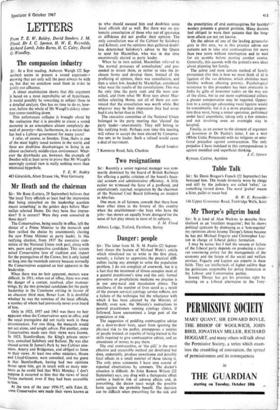Danger : people
Sir : The letter from M. N. M. Paulin (22 Septem- ber) shares the feature of Michael Watts's article which stimulated me to write in the first place, namely, a failure to appreciate the practical diffi- culties facing any attempt to solve the population problem. I do not complain of overwork, but it is a fact that the treatment of illness occupies most of a general practitioner's time and the only formal preventive or prophylactic medicine we practise is in our ante-natal and inoculation clinics. The smallness of the number of lives saved as a result of the present cervical cytology service reflects, not a failure of the technique but the reluctance with which it has been adopted by the Ministry of Health; even now, the Ministry's instructions to general practitioners running cytology clinics, if followed, leave unexamined a large part of the population at risk.
The suggestion of peddling contraceptive advice on a door-to-door basis, apart from ignoring the physical risk to the pedlar, presupposes a surplus of people trained, or capable of being trained in the skills required to give contraceptive advice, and an abundance of money to pay them.
The oral contraceptive, or 'the pill,' is the most effective and acceptable method yet developed but does, undeniably, produce unwelcome and possibly fatal effects in a small number of those taking it. The only press comments 1 have seen consist of reported observations by coroners. The doctor's situation is difficult. As John Rowan Wilson (22 September) says, any drug with a therapeutic effect carries a built-in risk of adverse effects and, in prescribing, the doctor must weigh the possible harm against the probable benefit. The decision can be difficult when prescribing for the sick and
the prescription of oral contraceptives for health?\
women presents a greater problem. Many doctors feel obliged to warn their patients that the long- term effects are not yet known.
On the advice of one of the leading gynaecolo- gists in this area, we in this practice advise our patients not to take oral contraceptives for more than two years without interruption and to wait for six months before starting another course. Generally, this accords with the patient's own ideas about planning her family.
The safest and most certain method of family prevention (for this is how we must think of it) is ligation of the vas deferens, which abolishes male fertility without affecting potency. Psychological resistance to this procedure has been overcome in India by gifts of transistor radios on the way out of the clinic, but in our more sophisticated culture a greater compensation may be required. Opposi- tion to a campaign advocating vasal ligation would be considerable, but it is a more practical proposi- tion than most, being a minor operation, performed under local anaesthetic, taking only a few minutes and not involving even an overnight stay in hospital.
Finally, as an answer to the element of argument ad hominem in Dr Paulin's letter, I am a WCP (White Celtic Protestant) with no religious or emo- tional prejudice against contraception. The only prejudice I have indulged in this correspondence is against muddled and superficial thinking.


































 Previous page
Previous page